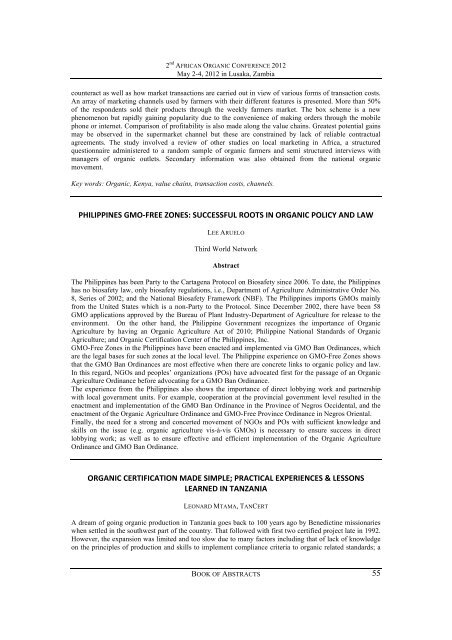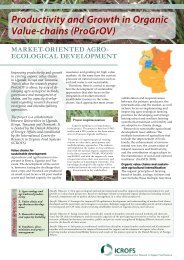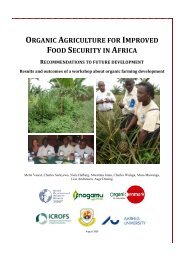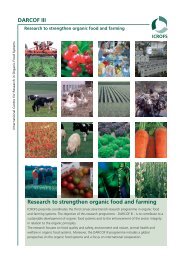The 2nd African Organic Conference â Mainstreaming ... - ICROFS
The 2nd African Organic Conference â Mainstreaming ... - ICROFS
The 2nd African Organic Conference â Mainstreaming ... - ICROFS
You also want an ePaper? Increase the reach of your titles
YUMPU automatically turns print PDFs into web optimized ePapers that Google loves.
2 nd AFRICAN ORGANIC CONFERENCE 2012<br />
May 2-4, 2012 in Lusaka, Zambia<br />
counteract as well as how market transactions are carried out in view of various forms of transaction costs.<br />
An array of marketing channels used by farmers with their different features is presented. More than 50%<br />
of the respondents sold their products through the weekly farmers market. <strong>The</strong> box scheme is a new<br />
phenomenon but rapidly gaining popularity due to the convenience of making orders through the mobile<br />
phone or internet. Comparison of profitability is also made along the value chains. Greatest potential gains<br />
may be observed in the supermarket channel but these are constrained by lack of reliable contractual<br />
agreements. <strong>The</strong> study involved a review of other studies on local marketing in Africa, a structured<br />
questionnaire administered to a random sample of organic farmers and semi structured interviews with<br />
managers of organic outlets. Secondary information was also obtained from the national organic<br />
movement.<br />
Key words: <strong>Organic</strong>, Kenya, value chains, transaction costs, channels.<br />
PHILIPPINES&GMO:FREE&ZONES:&SUCCESSFUL&ROOTS&IN&ORGANIC&POLICY&AND&LAW&<br />
LEE ARUELO<br />
Third World Network<br />
Abstract<br />
<strong>The</strong> Philippines has been Party to the Cartagena Protocol on Biosafety since 2006. To date, the Philippines<br />
has no biosafety law, only biosafety regulations, i.e., Department of Agriculture Administrative Order No.<br />
8, Series of 2002; and the National Biosafety Framework (NBF). <strong>The</strong> Philippines imports GMOs mainly<br />
from the United States which is a non-Party to the Protocol. Since December 2002, there have been 58<br />
GMO applications approved by the Bureau of Plant Industry-Department of Agriculture for release to the<br />
environment. On the other hand, the Philippine Government recognizes the importance of <strong>Organic</strong><br />
Agriculture by having an <strong>Organic</strong> Agriculture Act of 2010; Philippine National Standards of <strong>Organic</strong><br />
Agriculture; and <strong>Organic</strong> Certification Center of the Philippines, Inc.<br />
GMO-Free Zones in the Philippines have been enacted and implemented via GMO Ban Ordinances, which<br />
are the legal bases for such zones at the local level. <strong>The</strong> Philippine experience on GMO-Free Zones shows<br />
that the GMO Ban Ordinances are most effective when there are concrete links to organic policy and law.<br />
In this regard, NGOs and peoples’ organizations (POs) have advocated first for the passage of an <strong>Organic</strong><br />
Agriculture Ordinance before advocating for a GMO Ban Ordinance.<br />
<strong>The</strong> experience from the Philippines also shows the importance of direct lobbying work and partnership<br />
with local government units. For example, cooperation at the provincial government level resulted in the<br />
enactment and implementation of the GMO Ban Ordinance in the Province of Negros Occidental, and the<br />
enactment of the <strong>Organic</strong> Agriculture Ordinance and GMO-Free Province Ordinance in Negros Oriental.<br />
Finally, the need for a strong and concerted movement of NGOs and POs with sufficient knowledge and<br />
skills on the issue (e.g. organic agriculture vis-à-vis GMOs) is necessary to ensure success in direct<br />
lobbying work; as well as to ensure effective and efficient implementation of the <strong>Organic</strong> Agriculture<br />
Ordinance and GMO Ban Ordinance.<br />
ORGANIC&CERTIFICATION&MADE&SIMPLE;&PRACTICAL&EXPERIENCES&&&LESSONS&<br />
LEARNED&IN&TANZANIA&<br />
LEONARD MTAMA, TANCERT<br />
A dream of going organic production in Tanzania goes back to 100 years ago by Benedictine missionaries<br />
when settled in the southwest part of the country. That followed with first two certified project late in 1992.<br />
However, the expansion was limited and too slow due to many factors including that of lack of knowledge<br />
on the principles of production and skills to implement compliance criteria to organic related standards; a<br />
BOOK OF ABSTRACTS 55





